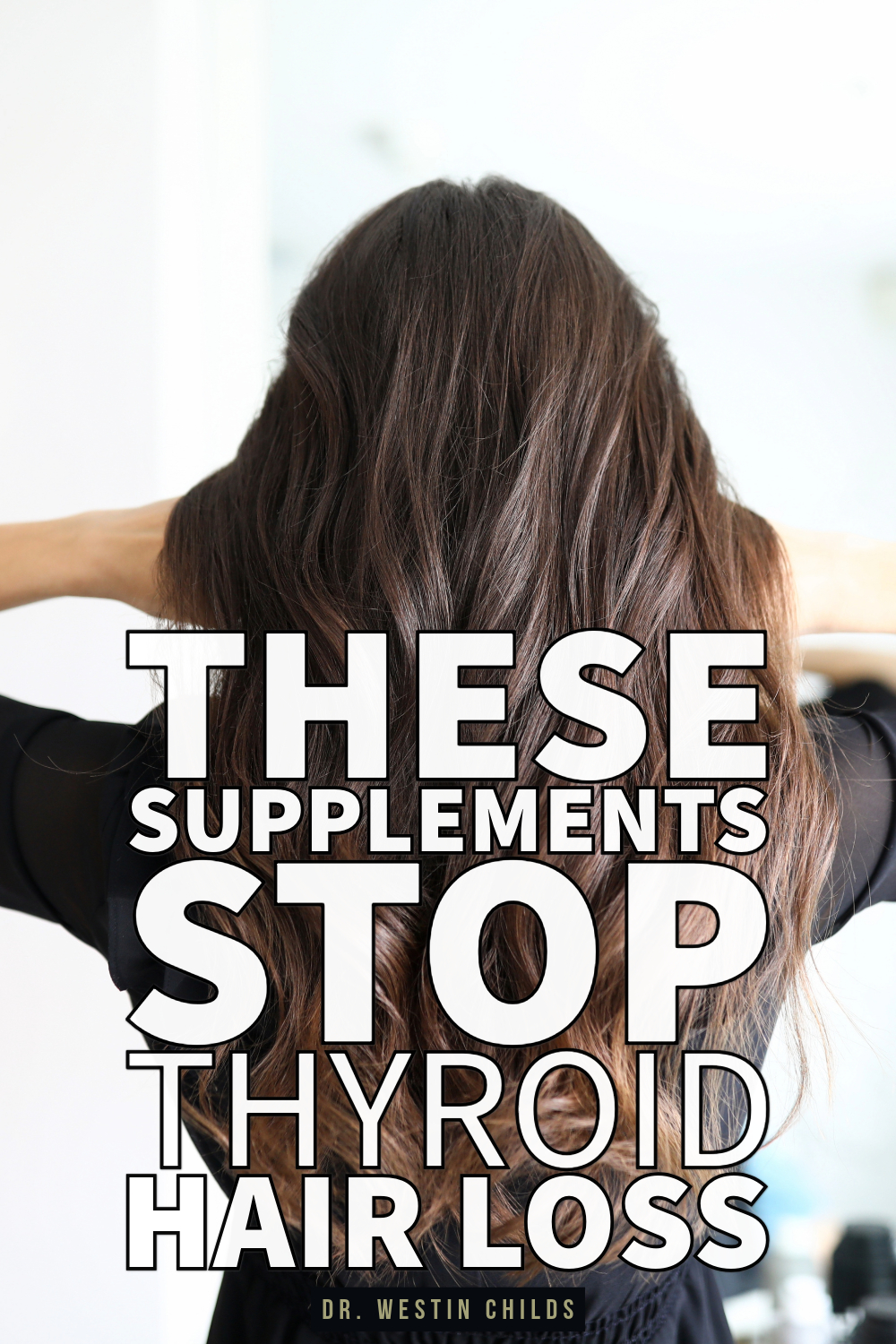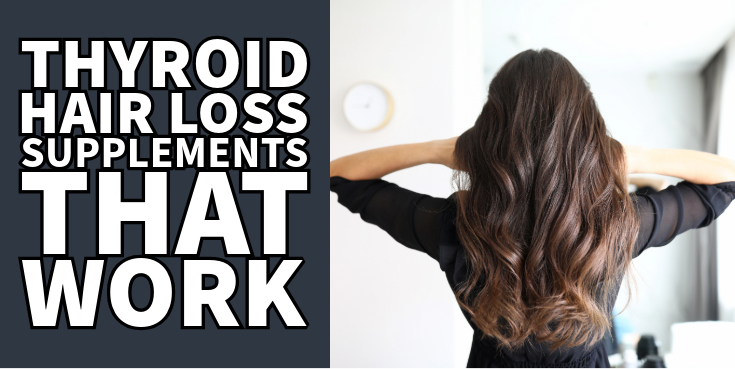Hair loss is one of the most frustrating symptoms that women with thyroid problems deal with.
That’s because it can be hard to pinpoint exactly what is causing it.
Oh, it’s definitely related to your thyroid; that much is obvious, but there are a lot of different ways that your thyroid problem can contribute.
Is it coming from direct thyroid hormone impact on the hair follicle, leading to diffuse hair thinning and shedding?
Or is it related to inflammation and autoimmune disease from your thyroid problem?
What about nutrient deficiencies caused by thyroid-related gut disturbances?
Or even changes to sex hormones from thyroid dysfunction?
Things can get messy in a hurry, making finding the right treatment difficult.
But you can make it easy on yourself by using supplements that work pretty much no matter what the cause of hair loss you are experiencing.
And that’s what we are going to talk about right now:
DOWNLOAD FREE RESOURCES
Foods to Avoid if you Have Thyroid Problems:
I’ve found that these 10 foods cause the most problems for thyroid patients. Learn which foods you should avoid if you have thyroid disease of any type.
The Complete List of Thyroid Lab tests:
The list includes optimal ranges, normal ranges, and the complete list of tests you need to diagnose and manage thyroid disease correctly!
1. Collagen
Collagen peptides are a no-brainer for thyroid patients suffering from hair loss.
Why?
Because, no matter what, collagen declines as you age, and your thyroid problem will only accelerate that age-related decline.
When you take a collagen supplement, you are providing your hair follicles with the building blocks they need to create keratin, which is what they are made of.
The result is thicker, stronger hair and faster hair growth.
Taking collagen won’t necessarily help hair loss, but it can make your hair look fuller and healthier, which, at the very least, can hide hair loss from other causes.
And even if it doesn’t prevent hair loss outright, taking it will still provide benefits to your skin and nails.
Who can say no to fewer wrinkles and better-looking nails, even if you don’t get a complete resolution in your hair loss?
Two out of three is still pretty darn good, and there will be some people to get all three.
How it helps:
Collagen provides the building blocks for hair growth due to its high concentration of keratin-promoting amino acids like proline and glycine.
How to use it:
For best results, take 12-20 grams of collagen peptides each day.
Not all collagens are created equal so I recommend sticking with those that have research backing their use, like VERISOL (1).
You can get the most research-backed peptides for thyroid patients here.
2. Iron
Iron deficiency slides under the radar of most thyroid patients, but it’s honestly the most missed cause of hair loss in this group of people.
Iron is required by the body for oxygen transportation, and that oxygen is used by your cells to create energy.
As you might imagine, growing hair is an energy-intensive process (2) and it’s one that your body will sacrifice for other tissues and organs if the need arises.
As a whole, women struggle to maintain healthy iron levels due to their menstrual cycle, and this problem is compounded in women with thyroid conditions due to thyroid-related malabsorption of iron in the gut.
To make matters worse, iron deficiency isn’t often caught until it causes full-blown anemia, but there are plenty of women sitting at suboptimal levels experiencing hair loss without anemia.
For these reasons, iron should be at the top of your mind if you are a woman with thyroid problems experiencing hair loss.
How it helps:
Iron provides the needed oxygen to hair follicles required for energy production and hair growth.
How to use it:
You should only take iron if you actually need it because taking too much can be toxic.
But testing iron levels is a poor way to assess this need.
Instead, check for something called ferritin (3) and use iron supplements, as needed, to get your ferritin to around 50 ng/mL.
Ferritin is a measure of iron usability, and you’ll see problems in ferritin before you see problems in your serum iron level.
I can’t tell you how many thyroid patients I’ve seen with hair loss related to a low ferritin, but with completely normal iron levels that get missed by their doctor.
For thyroid patients, liquid iron works best, and make sure to combine it with vitamin C to enhance absorption.
If you need it, here’s the liquid iron that I recommend (but remember, never use iron unless you know you are deficient!).
3. Silicon
Silicon is another great trace mineral that can be used to supercharge hair growth.
Because it’s not technically considered essential, it’s not commonly added to foods and supplements like we do for other essential nutrients.
And because silicon is really only found in plant-based foods, which, let’s face it, most people aren’t eating enough of, many women do not get enough silicon from their diet.

But that’s all the better for you because it presents an easy opportunity to get some big gains in the hair department.
How it helps:
Silicon is concentrated in the hair, skin, and nails, so supplementing with it supports hair structure, and elasticity, and reduces breakage.
How to use it:
There’s no official consensus on how much silicon any individual needs, but I’ve found that 20-40mg per day of silicon is the sweet spot for thyroid patients.
To avoid absorption problems, use a bioavailable source such as MMST (4) (monomethylsilanetriol).
This is the best option because it contains MMST and biotin (which we will soon discuss) in the exact amounts that thyroid patients need.
Using standard silicon will result in polymerization and malabsorption.
4. Biotin
Pretty much everyone has tried biotin for hair growth at some point in their lives with varying degrees of success.
Some people swear by it, and others say it’s useless.
So which is it? A little bit of both (5).
But I still recommend it and here’s why:
Biotin is absolutely essential for hair growth, but using it by itself is unlikely to provide you with the results you are looking for.
The secret to using it is to combine it with other nutrients, like those we are talking about right now.
And doing this allows biotin to do its job, which is to help create energy and ATP for cellular function and hair growth, while other nutrients support the quality of the hair itself.
How it helps:
Biotin promotes keratin production, which is what hair is made of, by increasing cellular energy.
How to use it:
Because biotin is a B vitamin, you can take a lot of it, and a lot of it is often required for hair growth.
A typical dose will range from 5,000 mcg up to 10,000 mcg.
Thyroid patients often see better results with higher doses, but be cautious of this because biotin can interfere with the accuracy of your thyroid lab tests.
That doesn’t mean you should avoid it, but just be aware of it.
5. Vitamin D
Vitamin D is another awesome hair-supporting nutrient for thyroid patients because of how it works:
It interacts with dormant hair follicles to help push them into the growth phase (6).
This matters a lot for thyroid patients who often suffer from telogen effluvium.
This type of hair loss is characterized by excess shedding due to hair follicles that remain dormant for too long.
Plus, vitamin D deficiency exists in 30-70% of thyroid patients, so there’s a pretty good chance you need it anyway.
How it helps:
Vitamin D supports healthy hair cycling, thereby supporting the #1 cause of hair loss in thyroid patients.
How to use it:
Dosing will vary from person to person based on absorption and utilization, but a safe daily dose is usually around 2,000-2,500 IU.
Do note that some people may need doses as high as 10,000 IU per day, though.
If you’re a thyroid patient, then get your vitamin D in liquid form along with vitamin A like this.
6. Rosemary Essential Oil
So far we’ve talked about supplements that work from the inside out, but you can also take advantage of treatments that work from the outside in.
One of those is rosemary oil.
Rosemary, when applied topically to the scalp, promotes the circulation of blood flow and all of the nutrients that it brings.
It also has anti-inflammatory properties, which act to protect fragile hair follicles from cellular damage.
And as far as efficacy goes, rosemary oil works pretty darn well.
It’s considered slightly less effective than minoxidil (7) but has a much safer side effect profile (though both options are considered safe).
How it helps:
Rosemary oil promotes hair growth by improving oxygenation and blood flow to the scalp.
How to use it:
You can find topical essential oil solutions that can be placed directly on the scalp, such as this one.
You can apply it directly and then massage it in with a silicon scrubber, or add it to your shampoo and conditioner for easier use.
7. Minoxidil
Even though minoxidil is considered more of a pharmaceutical than the others we’ve discussed so far, it is still available over the counter, so I would count it as a supplement.
Its effects are similar to those of rosemary oil, so if you prefer the more natural route, then go with that.
But if you don’t mind using pharmaceuticals, and you are in a hurry for some rapid results, minoxidil may be worth considering.
The biggest benefit of minoxidil is that it has been extensively studied and is FDA-approved for certain types of hair loss.
It works by supporting the length of time a hair follicle stays in its growth phase, thereby resulting in less shedding.
This is very helpful for thyroid patients who often have too many hair follicles in the dormant stage instead of the growth phase.
How it helps:
Minoxidil is often targeted towards men, but it’s just as effective for women (8).
It works by helping to regulate hair growth cycles.
How to use it:
All you need to do is purchase minoxidil over the counter and use it as directed.
It’s available in either a 2% or 5% solution and as a foam or as a liquid.
Final Thoughts
Thyroid-related hair loss is definitely distressing, but there’s always something you can do to address it.
From supplements that you take internally to essential oils that you place on your scalp, you can find something to improve the texture, quality, and growth rate of your hair.
Will it require some trial and error? Sure.
But it’s absolutely worth it.
By the way, there are many other thyroid hair loss treatments that you can take advantage of if supplements aren’t giving you the results you are looking for.
You can find a list of these treatments in this article.
Scientific References
#1. https://pmc.ncbi.nlm.nih.gov/articles/PMC6213755/
#2. https://pmc.ncbi.nlm.nih.gov/articles/PMC3678013/
#3. https://pmc.ncbi.nlm.nih.gov/articles/PMC7394174/
#4. https://pmc.ncbi.nlm.nih.gov/articles/PMC3649945/
#5. https://pmc.ncbi.nlm.nih.gov/articles/PMC11324195/
#6. https://pubmed.ncbi.nlm.nih.gov/34553483/
#7. https://pubmed.ncbi.nlm.nih.gov/25842469/
#8. https://pubmed.ncbi.nlm.nih.gov/15034503/








